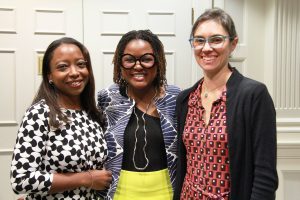Q&A: How studying the humanities at Carolina shaped a politician’s life
November 1, 2016 | M. Clay

At 24, Cannon is the youngest of three openly gay lawmakers in the Georgia House, representing the 58th District in east urban Atlanta. The black millennial Democrat identifies as “queer,” a term that can represent gay, lesbian, asexual, intersex and transgender people, among others. On Nov. 17, Cannon returned to Chapel Hill for a public exchange with her former professors Michele Berger, women’s and gender studies, and Misha Becker, linguistics, on activism and the humanities. The Institute for the Arts and Humanities sponsored the event at Graham Memorial. The following is an abbreviated version of the conversation among the panelists and members of the audience.
Talk a little about your humanities education and your current career. Are there any skills that you acquired in the study of linguistics, women’s studies or anything else in humanities that help you in your career today?
I chose to study linguistics [because] I was intrigued to learn to figure out that I could learn about children by learning about language. I was not expecting to declare a minor in women’s and gender studies. I had no clue it even existed. But I took the 101 class … and just totally sparked my political revolution. I was able to understand that you can actually declare a major in studying other folks.
When I was in my women’s studies class and being able to write 100 words – only 100 words – on a 50-page thing that I read, that really helped me to be concise and to boil it down. Like the elevator pitches we would have to do and we thought were a little silly. Would we actually be in an elevator with a white man talking about systematic oppression? But if we were, then [we’d have our] three sentences ready. I did find that there were tangible skills and I hope that y’all are keeping all those emails. Keep your books. Keep your notebooks – just for a few years – and reflect on them. And you will see that our professors are working really hard to give us what we need to go out in the world.
What was it like running for office as a black woman in Georgia?
[For candidate forums] I specifically had to prepare for sexist remarks. I deliberately have had to work to make sure that I’m not becoming this hard, calloused b-i-t-c-h that some people really don’t want, but also standing up to what I know is unacceptable behavior. As it relates to ageism, sometimes when I hear some of my colleagues calling me “girl,” I really think deeply about why they’re saying that. Like, if they say, “Hey, girl, are you sure you’re old enough to be here?” and coming back with, “Yeah, I think you were here when that law was written, right? You’ve been serving for so many years.”
What’s it like being a Democrat in a majority Republican House? How do you go about building a coalition with people who don’t agree with you?
In the Georgia House, there are 118 Republicans and 61 Democrats. We can’t get anything passed if we don’t work across the aisle. But only a small number of folks, mostly progressive folks, say, “We’re not here to argue. We’re here to work together.” Right now one of the issues we hope we’ll be able to do more of this work on is expanding health care access in Georgia. We’ve called it “Medicaid expansion” and that terminology has just not been working. It actually took our boss, the Speaker of the House, a Republican male who’s been serving for a number of years, losing his hospital because they can’t accept Medicaid patients to say, “I guess we should revisit this issue.” If we think of bipartisanship as a long-term effort, then it might be a little bit better.
Where do you plan to be in the next five to seven years?
I plan to be in my seat. I plan to be fighting for my seat every two years. I know that around the 2020 timeframe, we’ll be working hard on the census, making sure that folks get documented in that way, because that’s how our legislative maps are drawn. I was studying for the LSAT [for admission to law school], but I ran for office instead when the opportunity came. I do plan to be representing the folks in Georgia. There’s so much work to be done there, I can’t imagine being anywhere else.
Categories: Events, News

